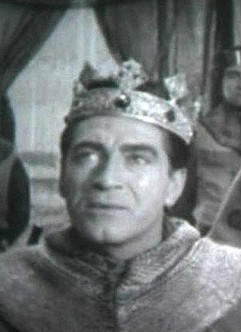| Richard the Lionheart | |
|---|---|
 | |
| Also known as | Riccardo Cuor di Leone (Italy) Richard Löwenherz (West Germany) |
| Genre | Adventure Family History |
| Written by | Stanley Miller Paul Tabori David Nicholl Mark Grantham |
| Directed by | Ernest Morris |
| Starring | Dermot Walsh Robin Hunter Alan Haywood Iain Gregory Sheila Whittingham Trader Faulkner |
| Opening theme | "Richard the Lionheart" |
| Ending theme | "Richard the Lionheart" |
| Composer | Bill Le Sage |
| Country of origin | United Kingdom |
| Original language | English |
| No. of series | 1 |
| No. of episodes | 39 (list of episodes) |
| Production | |
| Executive producers | Edward J. Danziger Harry Lee Danziger |
| Cinematography | Walter J. Harvey |
| Editors | Peter Pitt John S. Smith |
| Running time | 30 minutes |
| Production company | Danziger Productions Ltd. |
| Original release | |
| Network | Independent Television (ITV) (UK) |
| Release | 4 June 1962 – 13 December 1963 |
Richard the Lionheart was a British ITV television series which ran from 1962 to 1963, aimed at younger audiences. [1]
Contents
It began with the death of King Henry II, and put forward the traditional view of King Richard the Lionheart as a hero, and his brother Prince John (played by Trader Faulkner) as the villain.
Richard was played by Irish actor Dermot Walsh who said, "he was not always all one would like to see as a man. We have concentrated on his good side." Richard was perhaps a product of his time. A man brimful of contradictions. A brilliant general, but a poor ruler. A sensitive poet and singer.[ clarification needed ] [2]
The producers claimed that the series was based on fact as far as possible; though as little was known of Richard's personal life, "we have taken some liberties here and there," according to associate producer Brian Taylor in a TV Times article indicating the start of the series. [3]
Other regular characters in the series included Sir Gilbert (Robin Hunter), Sir Geoffrey (Alan Haywood), Blondel (Ian Gregory), Leopold of Austria (Francis de Wolff) and Queen Berengaria (Sheila Whittingham).
According to BFI Screenonline "despite the treadmill efforts of the production... this routine swashbuckler, presenting an atmosphere of knightly conduct versus villainous skulduggery, was saved from total tedium by the presence of recurring players Trader Faulkner, a sneering Prince John, and Francis de Wolfe as the delightfully monstrous Leopold of Austria." [4]
A single DVD was released by Stratx Digital Media on 6 June 2016. Although all episodes are thought to survive, the DVD contains only five episodes: "Long Live The King", "School For a King", "Crown In Danger", "The Pirate King" and "The Challenge". The picture quality for the most part is watchable, but the sound at times is flawed.[ citation needed ] In October 2022, Network released the entire series on DVD. [5]
In March 2025 Talking Pictures TV started a rerun of the series as part of its Saturday Morning Pictures slot.